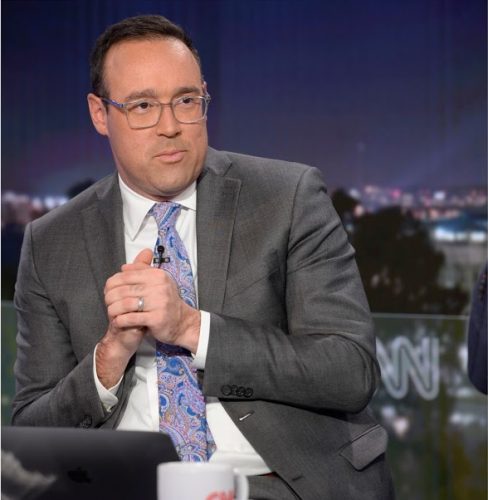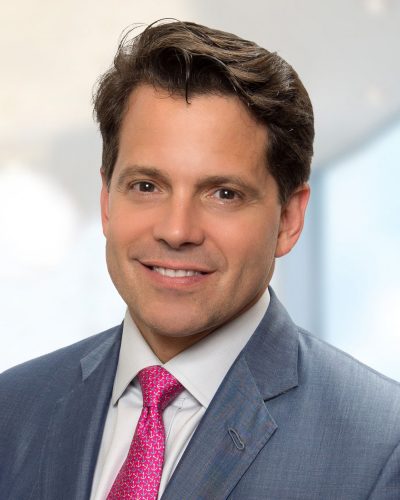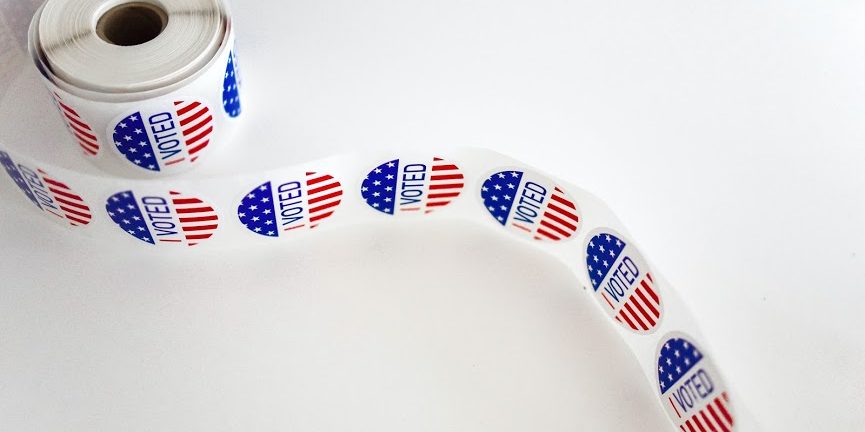Conversations with CNN Political Commentator Chris Cillizza, Former White House Communications Director Anthony Scaramucci & Cambridge Analytica Whistleblower Brittany Kaiser
Speaking Up, Out and Often: Chris Cillizza
 First, we spoke with Chris Cillizza, who had plenty to say about the election, RBG’s seat, and politics as “way more than a game.” In addition to being a CNN Politics Reporter and Editor-at-Large, Cillizza hosts “The Point,” a short, straightforward news podcast and Youtube series.
First, we spoke with Chris Cillizza, who had plenty to say about the election, RBG’s seat, and politics as “way more than a game.” In addition to being a CNN Politics Reporter and Editor-at-Large, Cillizza hosts “The Point,” a short, straightforward news podcast and Youtube series.
Washington Life: Let’s jump in: if the 2020 election were a sport, what sport would it be?
Chris Cillizza: UFC. Essentially a street fight without rules fought with an audience. It’s fitting that the president of UFC—Dana White—is a big Trump guy. Both see themselves as street- smart successes who have triumphed over the Ivy League eggheads (althoughTrump did go to Wharton Business School at U. Penn.) because they are willing to say and do things no one else will.
WL: How is the RBG seat adding to that street fight?
CC: There’s a scene in “The Simpsons” where Homer is barbecuing. He sprays some lighter fluid on the grill.Then he proceeds to empty the entire bottle onto the flame.And then another bottle.That’s what RBG’s death —and the resultant confirmation fight—does to this election. It takes what was already a monumental fight—with huge stakes—and makes it even bigger, if that’s possible.
WL: Where does Twitter factor into all of this?
CC: Twitter has a profound effect on the way that politics get covered because every politician, political operative and political reporter are on it. I tend to think of Twitter these days like an assignment editor. It flags the stories that people who pay very close attention to this stuff are talking about every day.
WL: Predict the tweet from @RealDonaldTrump on Wednesday, Nov. 4.
CC: “Joe Hiden’ and his Socialist friends are declaring victory. No WAY! Your favorite president is going to WIN.” I say this because if the race is anywhere close—as in Biden wins with less than 300 electoral votes—Trump will actively contest the results. And, even if it’s not particularly close, I am nearly certain that Trump will never formally concede or admit he lost. Instead he will spend the next four years running a sort of shadow presidency and weighing whether he can run again in 2024.
WL: Let’s turn to your tentatively titled book “It’s Way More Than A Game,” which aims to explain how presidents, like Trump, are understood through sports. What will we learn?
CC: Lots of people have looked at how politicians use sports as a way to bridge the gap with the “common man.” What I don’t think has been looked at enough is the opposite end of the lens:What the sports they played, watched and loved tell us about who these presidents actually were and are. That’s the conceit of the book.
WL: We are well aware of Obama’s love of basketball and Trump’s love of golf. How do these two sports set the two men apart?
CC: Basketball served as Obama’s connection—or one of the connections— that he used throughout his adult life to bridge the cultural divides he often found himself faced with.Trump’s love of golf seems to me best understood through the working dynamic of his life—not being included in the elite clubs, in particular. And so, what did he do? He started his own clubs! No one could deny he belonged then!
WL: Before we go, what’s your favorite political trivia question?
CC: So Many Options. How about: Which president served the briefest term in U.S. history? (It’s William Henry Harrison.) I love that one because I knew the answer thanks to “The Simpsons”—and the “We are the Mediocre Presidents” song.
Taking a Stand: Anthony Scaramucci
 “The Mooch” took the time to share his perspective on the Republican party, the importance of empowering immigrants, and the secret to that hair. The Skybridge Capital founder has kept himself busy, co-founding Right Side PAC and serving as an informal advisor for the Lincoln Project.
“The Mooch” took the time to share his perspective on the Republican party, the importance of empowering immigrants, and the secret to that hair. The Skybridge Capital founder has kept himself busy, co-founding Right Side PAC and serving as an informal advisor for the Lincoln Project.
WL: You were a longtime friend of President Trump, worked on his campaign, served on his executive transition team and briefly served as his communications director in 2017. Two years later, you began criticizing him openly; what changed?
Anthony Scaramucci: I thought he could be a post-partisan president who would address our country’s problems through the lens of an entrepreneur. After I left the administration, I stayed loyal to the president despite disagreeing with him on a number of issues related to policy and rhetoric, including things like the child separation policy at the border.
The proverbial straw that broke the camel’s back was when he told the four congresswomen to “go back to the countries where they came from.” It was a racist dog whistle that echoed of the treatment my grandparents suffered when immigrating from Italy more than 100 years ago.The divisions he was stoking in the country became too much for me to tolerate and it’s only gotten worse since. It’s clear now that he views the presidency merely as a means to gain power and enrich himself.
WL: What was the reaction following your endorsement of Biden?
AS: Mixed, as you can imagine. Some of my staunch Republican friends consider it a betrayal
of the conservative movement, although I don’t consider President Trump remotely conservative. More commonly, Republican and centrist friends thank me for having the courage to take a stand.
I agree with the president that we have too many anonymous voices out there criticizing the administration. I wanted to put my name on it. I wanted to be public with my support of Biden to give others of like mind the courage to do so as well.As I mentioned before, all we need to do is peel off 5 percent of Republican voters and we can deliver a stinging rebuke of Trumpism that consigns it to the dustbin of history.
WL: How would you like to remake the Republican party?
AS: I view the Republican party like a legacy company that’s headed for bankruptcy. It’s Donald Trump’s latest bankruptcy. So many voters have been hypnotized by the Trump cult that it’s going to take an emphatic defeat of Trumpism to break the spell. The G.O.P. needs to hit rock bottom before it rehabilitates itself. It’s clear that the Republican party needs to broaden its tent.
That means promoting immigration and empowering immigrants.That means making sure our citizens have access to affordable healthcare regardless of their employment status.That means making quality education affordable for anyone with a thirst for knowledge.That means giving women the right to choose (within a reasonable set of boundaries) and giving same-sex couples the right to marry whom they want to. My hope is that in a decade, the Republican party becomes a diverse coalition of citizens more focused on rekindling the American Dream and less focused on culture wars.
WL: What do you want voters to keep in mind as they cast their ballots?
AS: We cannot survive four more years where we see the destruction of our democratic institutions, global alliances and societal pacts.Trump has made it clear he just wants to win at all costs. He doesn’t care how many people die or whether he betrays his country. Biden’s stated goal, on the other hand, is to restore the process of compromise and civility to the American political process. He is a compassionate man from a blue-collar background shaped by his own personal experiences dealing with tragedy and grief. He wants to be a president for all Americans, and that’s what we sorely need right now.
On Amy Coney Barrett: Democrats are too pessimistic about how a conservative Supreme Court could reshape the country.
On that 11-Day White House Tenure: I thought I’d last longer than a carton of milk.
On Maintaining that Hair: It’s a closely-guarded proprietary process consisting of large amounts of hair dye and PRP injections.
On Distractions from Politics: ‘I read a lot of books, usually at least two at a time—one non-fiction history book and one page-turning novel.’
On Fortitude: ‘Crises are opportunities to evolve and grow if you approach them in an entrepreneurial way.’
Doing the Right Thing: Brittany Kaiser
 We also made sure to chat with Brittany Kaiser, the business development director-turned-whistleblower from Cambridge Analytica. Since exposing the massive Facebook data breach, she’s gone on to co-found the Own Your Data Foundation and the Digital Asset Trade Association (DATA), wrote her memoir Targeted (Harper Collins), and participated in the Netflix documentary “The Great Hack.” We spoke about protecting your data, fact-checking the ‘news’ and greed.
We also made sure to chat with Brittany Kaiser, the business development director-turned-whistleblower from Cambridge Analytica. Since exposing the massive Facebook data breach, she’s gone on to co-found the Own Your Data Foundation and the Digital Asset Trade Association (DATA), wrote her memoir Targeted (Harper Collins), and participated in the Netflix documentary “The Great Hack.” We spoke about protecting your data, fact-checking the ‘news’ and greed.
WL: It’s been four years since the 2016 election privacy breach. Are Americans any better at handling fake news?
Brittany Kaiser: I do not believe so. We are still not media literate, especially given that we are now leading a nearly completely digital life for the first time. Fake news and advanced technologies such as deep fakes threaten our digital media landscape. Unfortunately, many citizens do not know how to fact-check the news or even think about it.They take it as truth.
WL: With the election just over a month away, what can voters still do to protect themselves and their data?
BK: People can educate themselves from a digital intelligence standpoint and learn to read between the lines when it comes to privacy practices and what companies/applications are doing with data provided to them. Always read the fine print to know exactly how your data is being used and learn how to opt-out when possible.
WL: You’ve argued that Facebook should ban political advertising. Why?
BK: Mark Zuckerberg has committed a litany of violations. But political advertisements anywhere, not just
on Facebook, can be extremely misleading- especially when the facts are not being checked.The demographic-targeting and algorithms Facebook uses do make it attractive to all industries as they are one of the largest data providers in the world. However, failing to ban political advertising or warn people to do their own research, is simply unethical and greedy.
WL: How might the particular divisiveness surrounding this election be playing into the hands of those exploiting our data?
BK: Geopolitical events, acts of injustice, criminal activity at the highest office in our government are all tremendously powerful data sets. Expect to see targeted advertising on your smart phone or Alexa or Google device, which may be political in nature and driven by your activity.
WL: How has Covid-19 affected our risk of data breach and influence?
BK: Contact tracing apps are being used not just for Covid contact tracing, but for the geographical tagging of individuals and studying their movements and habits. Covid-19 has certainly opened the doors for governments to explore more ways of tracing people.
WL: In sum, why is digital literacy so important?
BK: Digital literacy is paving the way for our society to learn about and engage with
new technologies in a safe environment. There are a lot of digital threats, from disinformation to microtargeting, and questionable content on the internet, so people, especially children, need to be armed with the Digital Intelligence they need to navigate this new world we are building.
Additional interview research by editorial interns Asa Hiken and Maria Blanco.





